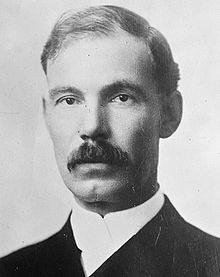| Profile | Major Works | Resources |
Edward Alsworth Ross, 1866-1951.
American economist and sociologist.
Originating from rural Illinois, Edward Alsworth Ross was part of the "new generation" of German-trained American economists. With an undergraduate degree from Coe College and instructor in a commercial school, E.A. Ross went abroad for a period of study at the University of Berlin. Upon his return, E.A. Ross obtained his Ph.D at Johns Hopkins under Richard T. Ely.
After short stints at Indiana and Cornell, Edward A. Ross was lured to serve on the faculty of the fledgling Stanford University in 1893, teaching economic theory and finance. While a popular teacher, the outspoken Edward A. Ross, and advocate of populist causes, soon became embroiled in controversy. A "free silver" man, E.A. Ross publicly endorsed the candidacy of William Jennings Bryan for the US presidency in 1896 raising the ire of Stanford's only trustee, the widow Mrs. Jane Stanford, who promptly demanded his resignation. Stanford president Jordan resisted, but Ross earned a reprimand and demoted to sociology (where his interests had lately been gravitating towards anyway). But Ross was not constrained, and his repeated pronouncements on public policy, notably calling for municipal ownership of urban transportation networks and immigration controls continued to pique. Finally, an 1900 speech lambasting immigrants and use of Chinese labor on railway construction provoked Mrs. Stanford's determination to dismiss him. Jordan attempted a compromise, but Stanford insisted and E.A. Ross was forced to resign in late 1900.
The "Ross affair" became an early celebrated case of academic freedom. Several Stanford faculty members resigned in protest, the public press picked up the story, and petitions from outraged academics across the country poured in (an AEA board, chaired by ERA Seligman, looked into the matter before pronouncing). The American Association of University Professors (AAUP) was founded not long after the Ross affair, while Stanford became tainted for the next few years with a reputation for intolerance, and found it difficult to recruit new faculty as a result.
E.A. Ross, in the meantime, found no difficulty getting a new job: he was soon hired by the University of Nebraska. In 1906, Ross moved to the University of Wisconsin as professor of sociology, where he would remain for the remainder of his career (he got embroiled in two more controversies at Wisconsin). E.A. Ross's economic work was not of much note - after some early promise, Ross moved firmly into sociology. Nonetheless some of his early works on public finance, and an interestingly prescient article on uncertainty (1896) are worth noting.
Throughout his career, Ross remained involved in a variety of populist progressive causes - nativism, racialism, eugenics, prohibition, etc. .
|
Major Works of Edward A. Ross
|
|
HET
|
|
Resources on Edward A. Ross
|
All rights reserved, Gonšalo L. Fonseca

